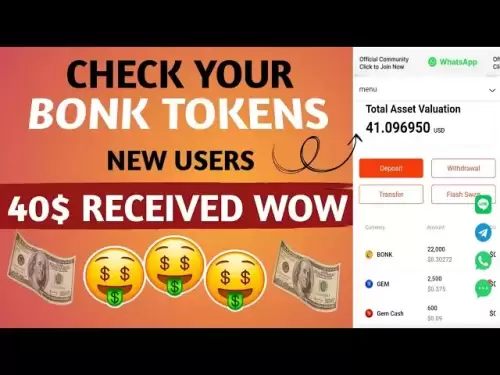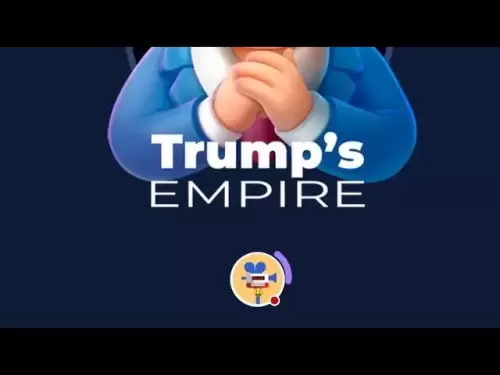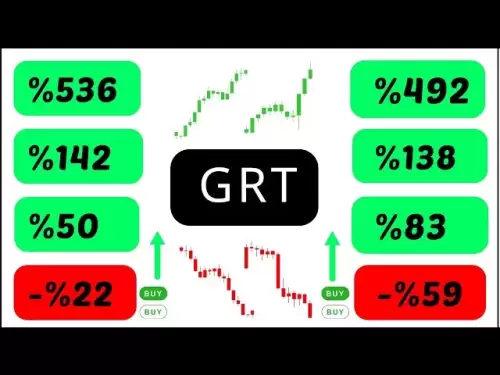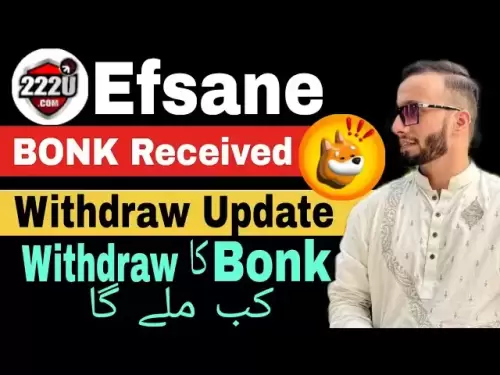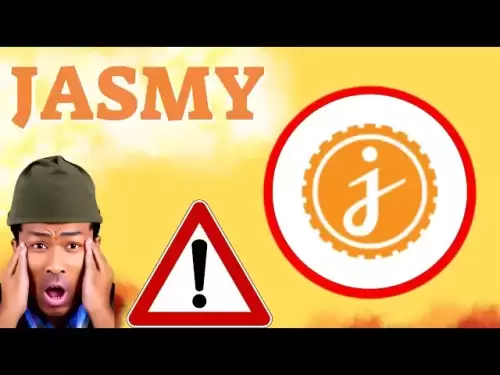-
 Bitcoin
Bitcoin $107,467.9126
1.26% -
 Ethereum
Ethereum $2,447.5288
-0.12% -
 Tether USDt
Tether USDt $1.0005
0.00% -
 XRP
XRP $2.1921
0.13% -
 BNB
BNB $647.2897
0.50% -
 Solana
Solana $144.8627
-0.37% -
 USDC
USDC $0.9996
-0.03% -
 TRON
TRON $0.2732
0.10% -
 Dogecoin
Dogecoin $0.1652
-0.18% -
 Cardano
Cardano $0.5700
-2.87% -
 Hyperliquid
Hyperliquid $37.0274
-1.81% -
 Bitcoin Cash
Bitcoin Cash $484.6957
0.19% -
 Sui
Sui $2.7354
-2.19% -
 Chainlink
Chainlink $13.1727
-1.49% -
 UNUS SED LEO
UNUS SED LEO $8.9978
-0.04% -
 Stellar
Stellar $0.2421
-2.33% -
 Avalanche
Avalanche $17.5633
-3.51% -
 Toncoin
Toncoin $2.8476
-1.94% -
 Shiba Inu
Shiba Inu $0.0...01166
-0.56% -
 Litecoin
Litecoin $85.1071
0.09% -
 Hedera
Hedera $0.1502
-2.96% -
 Monero
Monero $310.2774
-1.64% -
 Dai
Dai $0.9999
-0.01% -
 Polkadot
Polkadot $3.3584
-1.88% -
 Ethena USDe
Ethena USDe $1.0003
-0.04% -
 Bitget Token
Bitget Token $4.4443
2.90% -
 Pi
Pi $0.6242
14.04% -
 Uniswap
Uniswap $6.9774
-2.86% -
 Pepe
Pepe $0.0...09535
-5.05% -
 Aave
Aave $256.7574
-3.35%
Does DOT trading require KYC? What are the differences in requirements of different exchanges?
DOT trading on centralized exchanges like Binance and Coinbase requires KYC, while DEXs like Uniswap do not. KYC processes and requirements vary across platforms.
May 06, 2025 at 10:43 am
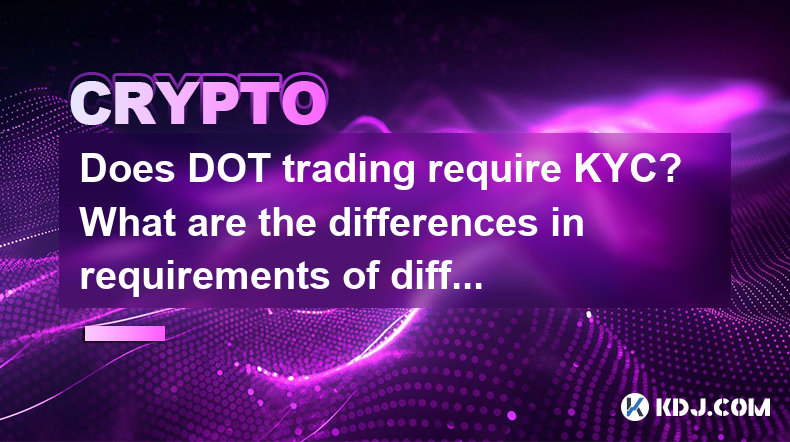
Does DOT trading require KYC? What are the differences in requirements of different exchanges?
When it comes to trading cryptocurrencies like Polkadot (DOT), one of the common concerns among traders is whether they need to undergo a Know Your Customer (KYC) process. The answer to this question can vary depending on the exchange you choose to use. In this article, we will explore the necessity of KYC for DOT trading and delve into the differences in KYC requirements across various exchanges.
Understanding KYC and Its Importance
KYC, or Know Your Customer, is a process used by businesses to verify the identity of their clients. In the context of cryptocurrency exchanges, KYC is crucial for several reasons. Firstly, it helps prevent fraud and money laundering by ensuring that users are who they claim to be. Secondly, it complies with regulatory requirements, which vary by jurisdiction but generally aim to protect users and maintain the integrity of the financial system.
Does DOT Trading Require KYC?
Whether or not you need to complete a KYC process to trade DOT depends on the exchange you use. Some exchanges, particularly those operating in regions with strict regulatory oversight, require all users to complete KYC before they can trade any cryptocurrency, including DOT. On the other hand, some decentralized exchanges (DEXs) may not require KYC, as they operate on a peer-to-peer basis and do not hold custody of users' funds.
KYC Requirements on Major Exchanges for DOT Trading
Let's look at some of the major exchanges and their KYC requirements for trading DOT:
h3>Binance
Binance is one of the largest cryptocurrency exchanges globally, and it has strict KYC policies in place. To trade DOT on Binance, users must complete a KYC verification process. Here are the steps involved:
- Register for a Binance account: Visit the Binance website and sign up with your email address.
- Complete the KYC process: Navigate to the KYC section in your account settings. You will need to provide personal information such as your full name, date of birth, and country of residence. You will also need to upload a government-issued ID (passport, driver's license, or national ID card) and a proof of address (utility bill, bank statement, etc.).
- Wait for verification: Once you submit your documents, Binance will review them. This process can take anywhere from a few hours to a few days.
- Start trading: Once your KYC is approved, you can deposit funds and start trading DOT.
h3>Coinbase
Coinbase, another prominent exchange, also requires KYC for trading DOT. The KYC process on Coinbase is similar to that of Binance:
- Sign up for a Coinbase account: Use your email address to create an account.
- Complete the KYC process: Provide your personal information and upload a government-issued ID. You may also need to take a selfie for facial recognition.
- Verification: Coinbase will verify your documents, which can take a few days.
- Begin trading: Once verified, you can fund your account and trade DOT.
h3>Kraken
Kraken, known for its robust security features, also mandates KYC for DOT trading. The process involves:
- Create a Kraken account: Sign up using your email.
- KYC verification: Fill out your personal details and upload a government-issued ID. You may also need to provide a proof of address.
- Verification process: Kraken will review your documents, and this can take a few days.
- Trade DOT: Once verified, you can deposit funds and start trading.
h3>Decentralized Exchanges (DEXs)
Decentralized exchanges like Uniswap and SushiSwap operate differently from centralized exchanges. These platforms do not require KYC because they do not hold custody of users' funds. To trade DOT on a DEX, you typically need to:
- Connect a wallet: Use a compatible cryptocurrency wallet (like MetaMask) to connect to the DEX.
- Swap tokens: Once connected, you can swap your existing cryptocurrencies for DOT without any KYC process.
Differences in KYC Requirements Across Exchanges
The KYC requirements can vary significantly from one exchange to another. Here are some key differences to consider:
h3>Level of Verification
Some exchanges offer different levels of verification. For example, Binance has three levels of verification, with each level granting different trading limits and features. Level 1 might require only basic information and a selfie, while Level 2 might require a government-issued ID and proof of address. Level 3 could involve additional checks, such as a video call or more detailed personal information.
h3>Types of Documents Required
The types of documents required for KYC can differ between exchanges. While most require a government-issued ID, some might also ask for proof of address or even a utility bill. Coinbase, for instance, might require a selfie for facial recognition, whereas Kraken might not.
h3>Time for Verification
The time it takes for KYC verification to be completed can vary. Some exchanges, like Binance, might take a few hours to a few days, while others, like Kraken, might take longer. The speed of verification can impact how quickly you can start trading DOT.
h3>Geographical Restrictions
Certain exchanges might have different KYC requirements based on the user's geographical location. For example, users in the United States might face stricter KYC requirements on some exchanges due to regulatory differences compared to users in other countries.
h3>Impact on Trading Limits
KYC verification can also affect your trading limits. Exchanges like Binance and Coinbase might impose lower trading limits for unverified accounts, while fully verified accounts can enjoy higher limits and additional features.
Frequently Asked Questions
Q1: Can I trade DOT without completing KYC on any centralized exchange?
A1: No, most centralized exchanges require KYC verification to trade DOT. If you wish to avoid KYC, you should consider using decentralized exchanges like Uniswap or SushiSwap.
Q2: How long does the KYC process typically take on major exchanges?
A2: The KYC process can take anywhere from a few hours to a few days, depending on the exchange and the volume of verification requests they are processing.
Q3: Are there any risks associated with not completing KYC on exchanges that require it?
A3: Yes, attempting to trade on exchanges that require KYC without completing the process can result in account suspension or closure. Additionally, you may face legal repercussions if you violate the exchange's terms of service.
Q4: Can I use the same KYC documents on multiple exchanges?
A4: Yes, you can use the same government-issued ID and proof of address on multiple exchanges, but you will need to go through the KYC process separately for each exchange.
Disclaimer:info@kdj.com
The information provided is not trading advice. kdj.com does not assume any responsibility for any investments made based on the information provided in this article. Cryptocurrencies are highly volatile and it is highly recommended that you invest with caution after thorough research!
If you believe that the content used on this website infringes your copyright, please contact us immediately (info@kdj.com) and we will delete it promptly.
- Pi Coin Price Prediction: June 26 - Will It Break $0.70?
- 2025-06-26 09:05:13
- Tokenization Takes Flight: Cross-Border Transactions Soar to New Heights
- 2025-06-26 08:30:12
- Midnight Airdrop: NIGHT Tokens and the Cardano-XRP Connection
- 2025-06-26 08:50:13
- DRML Miner & USDC: Cloud Mining Revolution in '25
- 2025-06-26 09:05:13
- DRML Miner, USDC, and Cloud Mining: What's the Buzz in 2025?
- 2025-06-26 09:30:12
- Barclays, Crypto, and Credit Cards: A Shifting Landscape
- 2025-06-26 09:10:14
Related knowledge

How to customize USDT TRC20 mining fees? Flexible adjustment tutorial
Jun 13,2025 at 01:42am
Understanding USDT TRC20 Mining FeesMining fees on the TRON (TRC20) network are essential for processing transactions. Unlike Bitcoin or Ethereum, where miners directly validate transactions, TRON uses a delegated proof-of-stake (DPoS) mechanism. However, users still need to pay bandwidth and energy fees, which are collectively referred to as 'mining fe...

USDT TRC20 transaction is stuck? Solution summary
Jun 14,2025 at 11:15pm
Understanding USDT TRC20 TransactionsWhen users mention that a USDT TRC20 transaction is stuck, they typically refer to a situation where the transfer of Tether (USDT) on the TRON blockchain has not been confirmed for an extended period. This issue may arise due to various reasons such as network congestion, insufficient transaction fees, or wallet-rela...

How to cancel USDT TRC20 unconfirmed transactions? Operation guide
Jun 13,2025 at 11:01pm
Understanding USDT TRC20 Unconfirmed TransactionsWhen dealing with USDT TRC20 transactions, it’s crucial to understand what an unconfirmed transaction means. An unconfirmed transaction is one that has been broadcasted to the blockchain network but hasn’t yet been included in a block. This typically occurs due to low transaction fees or network congestio...

How to check USDT TRC20 balance? Introduction to multiple query methods
Jun 21,2025 at 02:42am
Understanding USDT TRC20 and Its ImportanceUSDT (Tether) is one of the most widely used stablecoins in the cryptocurrency market. It exists on multiple blockchain networks, including TRC20, which operates on the Tron (TRX) network. Checking your USDT TRC20 balance accurately is crucial for users who hold or transact with this asset. Whether you're sendi...

What to do if USDT TRC20 transfers are congested? Speed up trading skills
Jun 13,2025 at 09:56am
Understanding USDT TRC20 Transfer CongestionWhen transferring USDT TRC20, users may occasionally experience delays or congestion. This typically occurs due to network overload on the TRON blockchain, which hosts the TRC20 version of Tether. Unlike the ERC20 variant (which runs on Ethereum), TRC20 transactions are generally faster and cheaper, but during...

The relationship between USDT TRC20 and TRON chain: technical background analysis
Jun 12,2025 at 01:28pm
What is USDT TRC20?USDT TRC20 refers to the Tether (USDT) token issued on the TRON blockchain using the TRC-20 standard. Unlike the more commonly known ERC-20 version of USDT (which runs on Ethereum), the TRC-20 variant leverages the TRON network's infrastructure for faster and cheaper transactions. The emergence of this version came as part of Tether’s...

How to customize USDT TRC20 mining fees? Flexible adjustment tutorial
Jun 13,2025 at 01:42am
Understanding USDT TRC20 Mining FeesMining fees on the TRON (TRC20) network are essential for processing transactions. Unlike Bitcoin or Ethereum, where miners directly validate transactions, TRON uses a delegated proof-of-stake (DPoS) mechanism. However, users still need to pay bandwidth and energy fees, which are collectively referred to as 'mining fe...

USDT TRC20 transaction is stuck? Solution summary
Jun 14,2025 at 11:15pm
Understanding USDT TRC20 TransactionsWhen users mention that a USDT TRC20 transaction is stuck, they typically refer to a situation where the transfer of Tether (USDT) on the TRON blockchain has not been confirmed for an extended period. This issue may arise due to various reasons such as network congestion, insufficient transaction fees, or wallet-rela...

How to cancel USDT TRC20 unconfirmed transactions? Operation guide
Jun 13,2025 at 11:01pm
Understanding USDT TRC20 Unconfirmed TransactionsWhen dealing with USDT TRC20 transactions, it’s crucial to understand what an unconfirmed transaction means. An unconfirmed transaction is one that has been broadcasted to the blockchain network but hasn’t yet been included in a block. This typically occurs due to low transaction fees or network congestio...

How to check USDT TRC20 balance? Introduction to multiple query methods
Jun 21,2025 at 02:42am
Understanding USDT TRC20 and Its ImportanceUSDT (Tether) is one of the most widely used stablecoins in the cryptocurrency market. It exists on multiple blockchain networks, including TRC20, which operates on the Tron (TRX) network. Checking your USDT TRC20 balance accurately is crucial for users who hold or transact with this asset. Whether you're sendi...

What to do if USDT TRC20 transfers are congested? Speed up trading skills
Jun 13,2025 at 09:56am
Understanding USDT TRC20 Transfer CongestionWhen transferring USDT TRC20, users may occasionally experience delays or congestion. This typically occurs due to network overload on the TRON blockchain, which hosts the TRC20 version of Tether. Unlike the ERC20 variant (which runs on Ethereum), TRC20 transactions are generally faster and cheaper, but during...

The relationship between USDT TRC20 and TRON chain: technical background analysis
Jun 12,2025 at 01:28pm
What is USDT TRC20?USDT TRC20 refers to the Tether (USDT) token issued on the TRON blockchain using the TRC-20 standard. Unlike the more commonly known ERC-20 version of USDT (which runs on Ethereum), the TRC-20 variant leverages the TRON network's infrastructure for faster and cheaper transactions. The emergence of this version came as part of Tether’s...
See all articles




















